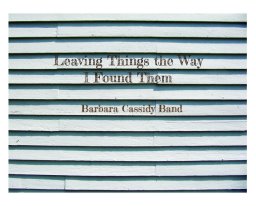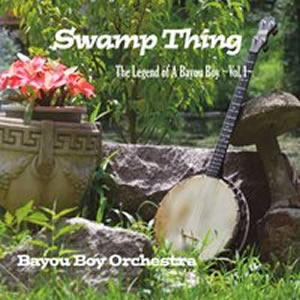 Barbara Cassidy sings and writes in a style solidly influenced by traditional folk idioms passed down through the centuries. Aside from that distinction from modern folkies and singer-songwriters, she also uses her voice in a style suggesting classical refinement. When she puts it all together on this Barbara Cassidy Band album, Leaving Things The Way I Found Them, she comes up with something wholesome and truthful. She leaves traditional forms very much the way she found them, after doing them sweet, tender justice.
Barbara Cassidy sings and writes in a style solidly influenced by traditional folk idioms passed down through the centuries. Aside from that distinction from modern folkies and singer-songwriters, she also uses her voice in a style suggesting classical refinement. When she puts it all together on this Barbara Cassidy Band album, Leaving Things The Way I Found Them, she comes up with something wholesome and truthful. She leaves traditional forms very much the way she found them, after doing them sweet, tender justice.
Opener “How Many Times” finds Cassidy pressing out her brief, sweet vocal notes, see sawing them over a warm, wide low end beat. This chirpy, upbeat ode to the love of her life becomes an embraceable duet with band mate Eric Chasalow. The chorus will certainly make anybody want to sing along to its up swinging arc. It’s not just her technique but Cassidy’s heartfelt enthusiasm that lovingly brings this piece to life. Nice touches abound. David “Goody” Goodrich’s glockenspiel notes tinkle out their own special magic.
“I Once Wished” is a bit somber in vocal tone and in its bittersweet acoustic guitar picking. Forlorn bass runs and emotive violin shadow the melancholy wistful glance back at childhood. Sincere emotion is, again, the standout feature. Cassidy stretches her timbre into a wide expression, mourning for the way she once hoped things would be. She makes you feel the chasm between real life and the make believe happiness of children. Yet, she doesn’t let this fall into gloom as much as face the adult world with its very grown up disappointments. Upright bass player Robert Nieske and violinist Ian Kennedy make their valued presence felt her and throughout the album.
“If Time Stood Still” plays out with a mid-tempo beat peppered with tender electric guitar notes darting skillfully around it. Cassidy has a way of guiding her voice over the merry, lively, accessible beat. Her assertive vocal over the firm guitar notes beneath pull one in and carries one along with her journey.
“Simon Simon” is sung by Chasalow who is Cassidy’s co-writer on most of these tunes. “Simon Simon” is credited solely to Chasalow, and that is an honest gesture from Cassidy. She takes the word “Band” in Barbara Cassidy Band to mean it’s a group effort. It’s also a quality addition. Chasalow’s tune is a swift, chugging piece of fun.
“Wayfaring Stranger,” a traditional folk song, echoes with the centuries it has lived through. You can feel the history in this one. Cassidy’s vocal is blessed with her thick, rich timbre, pure and beauteous when she sustains them over a persistent acoustic guitar melody. As she projects it out over Chasalow’s feisty acoustic guitar picking, each sustained note is full of feeling, grabbing and holding onto the listener’s ears and imagination.
“Spring In Wartime” carries a somber message and Cassidy’s voice is more than up to the task of filling in the colors and tones of mourning. Her forlorn emotional qualities, beautifully augmented by Chasalow’s flute, creates an entire fabric that envelops the listener in what she likely was feeling when her friends wrote it. The tune is credited to Teasdale/Chasalow. Another testament to Cassidy’s willingness to let her band mates share their own songs. Cassidy is also the right person to sing this work. Her vocal lilts just so perfectly and somberly over the guitar, and she truly brings out the futile sadness of the lyrics.
“Ovenbird” glides through the listener’s consciousness on the strength of Cassidy’s narrative singing pace. A lushness in the thick guitar strumming builds a warm backbone for the rich timbre she employs here. Light organ chords fill in another lush layer of sound, completing the flute and complimenting Cassidy’s storytelling voice. It’s just a lovely work of melody and voice.
Cassidy sings in a sweeter, softer lilt, almost like a musical performer does, on “Here Again.” Like musical theater, this piece unfolds its part of a larger narrative, with Cassidy offering small bits at a time of her lovingly sung verses and coos.
Cassidy tackles the a cappella “The Quiet Joys Of Brotherhood.” Her voice is a huge thing of energy. Self-restrained, she only releases a certain amount of vocal power in each verse. This creates a crackling energy below the surface that breathes incredibly life into the story she is telling.
“Anna’s Song-Shohola, 1864” is a Cassidy/Chasalow original that sounds very much rooted in traditional folk. Playing out like the old timey numbers she has recorded here, the narrative reaches far into story and sound. The melodic tapestry could’ve been written two hundred years ago. Cassidy’s voice is chockfull of the echoing timbres, colors, and tones of old ballads, jigs, and reels.
“Banks Of The Galena” trots along with heart and nostalgia. The words and the singing style come across with that wholesome traditional style Cassidy makes shine. Yet, an electric guitar melody gives it a modern twist that echoes beautifully with the traditional forms that inspire it. Like Cassidy’s other songs this one too has a sense of largeness due to wide, expansive arc.
Closing out with the traditional “Sile Ni Eidher,” Cassidy wraps things up with this tender nod to the past. Her a cappella vocal is, as always, full of emotional and musical pureness. The singer-songwriter, by the end of her disc, has paid due homage to her traditional influences. She is a good student of this music, and she has crafted her voice into the perfect instrument for delivering them.

